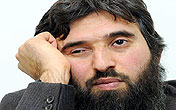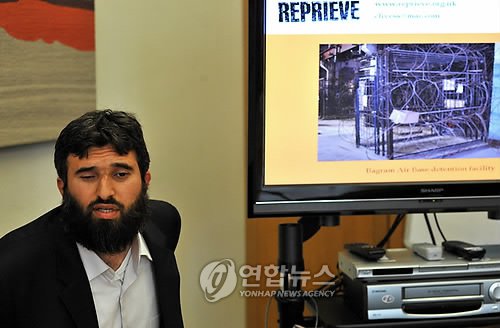 Today, CNN reports that a "Yemeni colonel and two soldiers were killed in clashes with Islamic militants in the southern province of Abyan." According to one official, "Clashes are intensifying in the city and the government is trying to put an end to the militants' control over the city."
Today, CNN reports that a "Yemeni colonel and two soldiers were killed in clashes with Islamic militants in the southern province of Abyan." According to one official, "Clashes are intensifying in the city and the government is trying to put an end to the militants' control over the city."
On Saturday Yemeni army forces killed 18 ‘terrorists’ in Zinjibar, the capital of the southern Abyan province, and another three in Lawdar, a second provincial city, according to Reuters. In a text message from the Yemeni Defense Ministry, officials said that the army had also destroyed a weapons and ammunition cache in Zinjibar.
Yemeni President Saleh sustained serious burns and shrapnel injuries in an attack on his presidential complex in Sanaa on June 3. Saleh was transported to Saudi Arabia and is “in stable condition and recovering,” the Yemen’s ambassador to Britain told Reuters. But, according to an informed source, identified by Agence-France Presse as a Yemeni expatriate in Riyadh, the health of Yemeni President Ali Abdullah Saleh was 'bad.' (Source: Al Arabiya).
Colonel mustard in the library with the candlestick
While the government has blamed the al-Ahmar tribe for the attack, Al Jazeera reports that some residents in Sanaa suspect that the raid could actually be orchestrated by the president himself.
 Omar Deghayes was born the son of a prominent Libyan lawyer, an "opponent of the increasingly totalitarian Gaddafi" later taken away by the Libyan authorities and killed. After his father's death, Omar Deghayes settled with his family in Saltdean, Great Britian. As a British resident and student of law, Deghayes was imprisoned in Guantanamo for six years after he was abducted from Pakistan and sold for bounty to the United States military. As many of his interviews rightly point out, Mr. Deghayes lost an eye after it was gouged by a Guantanamo guard.
Omar Deghayes was born the son of a prominent Libyan lawyer, an "opponent of the increasingly totalitarian Gaddafi" later taken away by the Libyan authorities and killed. After his father's death, Omar Deghayes settled with his family in Saltdean, Great Britian. As a British resident and student of law, Deghayes was imprisoned in Guantanamo for six years after he was abducted from Pakistan and sold for bounty to the United States military. As many of his interviews rightly point out, Mr. Deghayes lost an eye after it was gouged by a Guantanamo guard.
You were captured and detained between May 2002 and Dec 2007?
2007 May...April? Yes. I think. Probably May or April…yes.
Do you recall where you were held? Were you going from one camp to another? Do you remember those dates...?
No. It's going to be very difficult because when we were in the prisons in Guantanamo, we had no idea of dates or time.
It was difficult to...we didn't have any watches. We weren’t allowed to know dates or things...I think until 2005, when the lawyers started to come in…we started to have some idea of the dates.
And then after that I think 2006 we were allowed to know what time...they had time...a big clock hanging in some of the...not the cells...but in the middle in between the cells. So, it would be difficult to say which dates I was in which prison and so on...
Do you have a recollection of the places that you were actually held?
Yes. Yes. I do. Yes. Even though we weren't allowed to even know that. But we eventually did know where we are.
Where were you first?
I was first in Lahore. I was kept in Lahore prison for two months. And I think it was a maximum security in Lahore. Kind of a fortress, which is made special for, I think, terrorism cases and things like that. There are some Pakistani people there. And some Arabs.
 Authored by Alexa O'Brien and Heather Marsh.
Authored by Alexa O'Brien and Heather Marsh.
Omar Deghayes is a UK citizen who was imprisoned in Guantánamo in January 2002 and freed from there on December 18, 2007. Details of his treatment in Guantánamo can be read here. He speaks to PressTV about his experiences here.
Omar Khadr is a Canadian citizen who was captured at fifteen after the compound he was living in in Afghanistan was bombed by US military. He was tortured at Bagram prison and Guantánamo, and has spent the last nine years of his life imprisoned by the US. WL Central coverage on Omar Khadr is here.
Omar Deghayes spoke to WL Central's Alexa O'Brien on June 5. The following is an excerpt from that interview.
Did you have any contact with Omar Khadr?
OD: Yes definitely. I know him very well. He was locked up in Camp 5 for a long time, and I saw him in the other camp also before for a short period of time. But in Camp 5 I was locked up with him for a long time.
Do you think that Omar Khadr would be a threat to society if and when he is released to Canada?
OD: No. Definitely not. Even the guard and the interrogators in Guantanamo I think used to like him a lot ... for his personality. He is an open, kind person. I don't think he would be a threat to society. No.
Theme by Danetsoft and Danang Probo Sayekti inspired by Maksimer